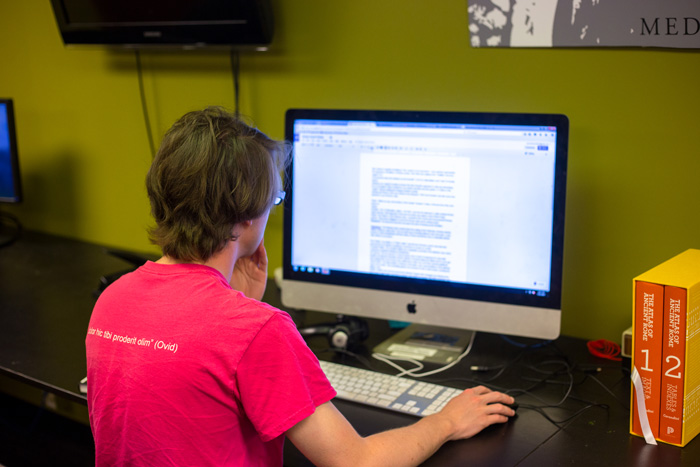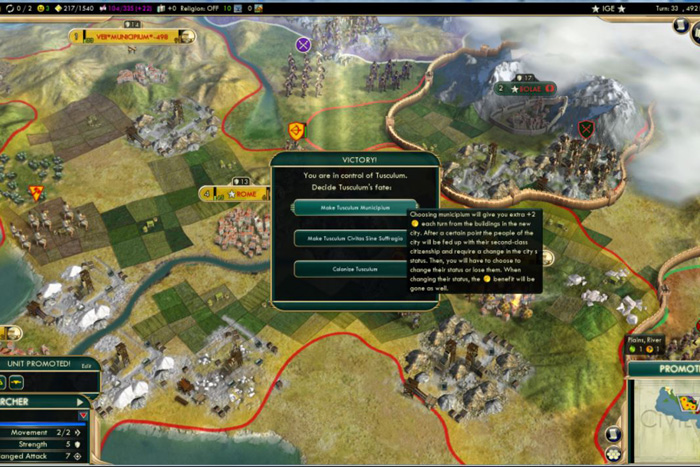Coding Our Way Through History

Ian White ’19 dug into a rarely examined period of Roman history for a recent digital humanities project. (And if you're wondering, the text on his shirt is an Ovid quote: "dolor hic tibi proderit olim" or "someday this pain will be useful to you.") Photos by Nicholas Peterson.
Students mod a sprawling video game to set it in an underexplored period in Roman history
by Tony Moore
On one hand, we’ve got WorldBuilder and ModBuddy, XML and LUA—tools and elements of computer science that might make the right brain hurt a little. On the other, a deep dive into the history of Rome during the period when it grew from a city into the dominant force of the Italian peninsula. It’s stuff that might make left-brainers run for cover.
Guess where these two hands meet? In the liberal arts, of course. Specifically, though, on the fertile ground of the digital humanities and in a summer research project called “The Rise of the Roman Republic: A Gaming Simulation,” launched by Assistant Professor of Classical Studies Scott Farrington and two students.
Mod the system
A challenge for all, the project set out to modify to an existing game, Civilization 5, setting it in a new timeframe and adding a civilization that doesn’t exist in the off-the-shelf version.
“The simulation not only showed the students historical information in a new context, but it also shows that there is more than one application for the study of history,” says Farrington, who chose 5th-3rd century B.C.E. Rome because it’s not covered in other games and also provided new avenues of historical investigation. “Although I don't imagine that my students will start engineering historical gaming software, I do think that it’s important to show them that there are surprising applications for the study of history. I hope our project will encourage others to make similar unexpected connections between their studies and the world.”
Farrington says that because that particular era of Roman history is often overlooked in ancient history classes, Ian White ’19 (classical studies, economics) had an opportunity to do some comprehensive study of a period that he wouldn’t ordinarily access as an undergraduate student. “Nevertheless,” Farrington says, “the history of this period is complicated and interesting, and the three of us took advantage of the opportunity it provided for some close investigation.”

Unrelated elements come together
On the other side of the project was the tech, and handling the heavy lifting was Catalina Ionescu ’19 (physics, computer science), who was able to deploy skills she’s learned in the classroom in wholly new ways.
One tricky element was wrangling the game’s parameters so they fit historical facts, such as the unique way Rome managed its expansion throughout the Italian peninsula. For example, in Civilization 5, when players capture a city, they can turn it into a puppet state, add it to their own empire or level it. But Rome had a distinct way of granting varying degrees of partial citizenship to the peoples it conquered, and modifying the game to reflect this system of expansion was a complicated task. But it was a challenge Ionescu eventually used to her advantage.
“It was a great experience because it allowed us to combine two seemingly unrelated fields in order to produce something both fun and educational,” says Ionescu. “What I personally loved about it was that I had to pick up new programming skills on the go as I had to incorporate more and more historical data into the project.”
It all adds up
The project was enhanced by a panel discussion on war-gaming simulations Farrington and his students attended at the U.S. Army War College, just across town. The three sat in while experts on the subject discussed how they employ war-gaming to train high-ranking officers in strategy and tactics. Further enhancement followed, thanks to Todd Bryant, language technology specialist in the Department of Academic Technology, who introduced Ionescu to the tools used to create the Civilization V mods. And because of the project, Ionescu now feels comfortable tackling a wide variety of information and writing code based on it.

Catalina Ionescu ’19 found that the skills she learned in the classroom came alive in new ways.
“I think this is a particular advantage that a tech person could benefit from at a liberal-arts college,” she says. “I don’t think I would have been able to work on something like this in a big technical institute.”
The group has applied to take the project to a digital humanities conference this fall so they can present the work to peers, and Farrington plans to use the modified game in his Roman history classes. But in the end, making a playable game might be its own reward for anyone who finds it on Steam, the world’s largest game distribution platform.
“By making the mod publicly available, our students have an opportunity to put their project to work in the world at large, and we hope that Civ 5 fans will play our mod, enjoy it and learn some things about Roman history,” Farrington says. “Dickinson's commitments to interdisciplinary studies and digital humanities open a lot of avenues for students and professors to work closely with each other, and Ian and Catalina created something really remarkable. I’m glad to have had the opportunity to collaborate with them and to have played a part in making their project a success.”
Learn about more gaming mods created by Dickinsonians.
Take the next steps
Published August 30, 2017